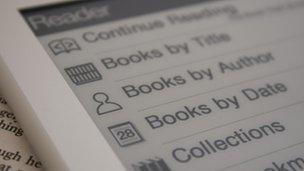Publishing's digital switchover
- Published
- comments

Take two industries trying to adapt to the digital era, music and publishing. One is packed with bright young ruthlessly ambitious people who have to be aware of the latest trends - the other is, well, publishing. So which is coping better? Publishing, believe it or not.
The latest figures from the Publishers Association make surprisingly positive reading for anyone in the book trade. For some years, readers of specialist, technical and academic titles have been going digital - now the general reader is embracing e-books.
Spending on digital fiction books rose from £23m in the first six months of 2011 to £64m in the same period this year. In total, digital sales now account for more than £1 in every £8 we spend on books.
But what will cause the publishing industry to raise a glass of dry sherry is that the figure for physical book sales is down just 0.4% - and overall physical and digital sales are up 6%. It seems that the move to digital is not eroding the overall value of publishing as it has in the music industry where, as the saying goes, analogue dollars are being replaced by digital cents.
"It looks like unalloyed good news", Richard Mollet, the chief executive of the Publishers Association, told me. It seems that all those people reading Kindles or other e-readers on the way to work are actually consuming more books than they did before.
Of course, the big contrast with the music industry is the extent of online piracy, which has yet to make much of an impact on publishing. "We do send thousands of copyright infringement notices to Google every month," Mr Mollet told me, "but it's not on the scale of the music industry."
The book trade did have the benefit of observing what happened to music long before its own digital transformation got underway. What's more, legal digital platforms like the Sony Reader and the Kindle were around before consumers had the chance to choose an alternative unlicensed "brand": "We didn't have a Limewire or a Napster to contend with," Richard Mollet says.
Maybe pirated copies of digital books were never going to be as popular as their musical equivalents - or maybe times will get harder as the pirates work out how lucrative this market can be. And of course if you're a high street bookseller, squeezed for years by online giants like Amazon and now watching readers use your shops as showrooms before going home to download to their e-readers, external, it is hard to be cheerful.
But for now, the fusty old publishers are looking rather more comfortable in the 21st Century than the hip young gunslingers of the music industry.